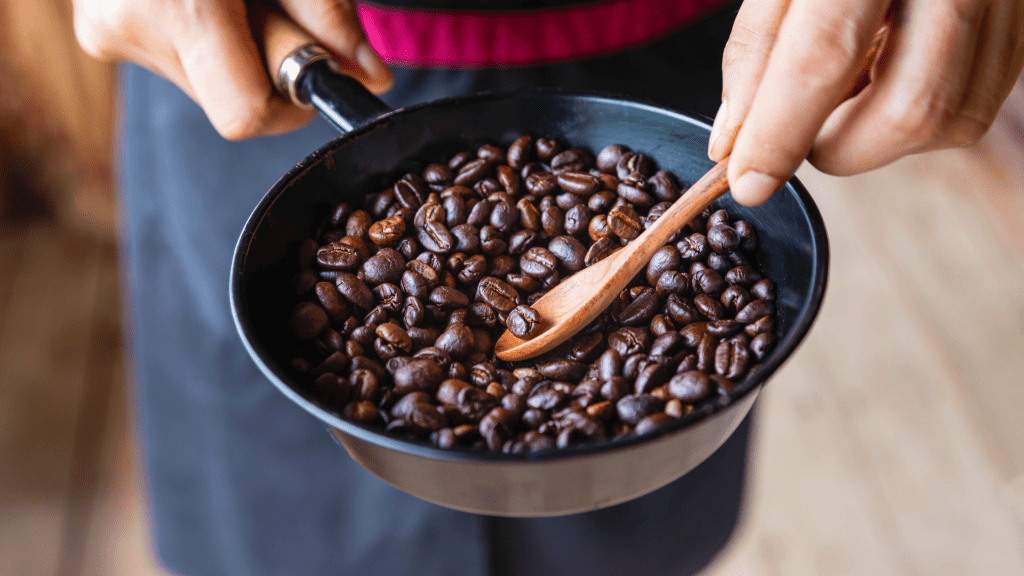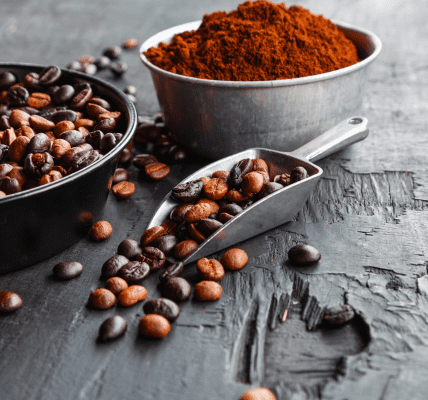
You may have some gourmet coffee stored away in the pantry. Or, you may have the habit of forgetting your fresh brew. I’ll not be surprised if you bombard me with questions like, “When does coffee expire?” or “Does coffee go bad?”
Coffee’s shelf life varies from a few months to a few decades, depending on whether it’s in the form of beans, grounds, instant powder, or pods. Thankfully, these don’t become deadly past the printed date but lose flavor. But brewed java starts to deteriorate after a few hours.
What about coffee mold – or a cup of java with milk? And what about reheating brew? Today I’m going to tell you all about detecting if your coffee has gone bad and how to extend its shelf life. So keep reading!
Does Coffee Go Bad?
Table of Contents
If your fresh brew has been sitting out for a while, you may wonder if the drink is safe to consume. When it’s black coffee, i.e., made without milk, it will not cause any harm or make you sick.
But as the brew starts to cool down, its flavors gradually deteriorate due to oxidation. However, if there’s milk in the cuppa sitting out, it can become unsafe for you.
And if there’s dry coffee waiting in your pantry, is it too late to use it to fix yourself a cup of java? The good news is that in dry form, coffee doesn’t really become unsafe when left unused for a long time.
So, beans, grounds, powder, etc., won’t make you sick after crossing the shelf life. The date mentioned on the packages of these products is the “best before” date and not the expiration date.
That brings us to the bad news. While coffee doesn’t “go bad” or become harmful, it can deteriorate significantly in taste and aroma.
But does coffee lose its caffeine over time? Thankfully, caffeine is a stable compound, and it doesn’t just evaporate or degrade over time as coffee gets older.
Also, remember that coffee beans and grounds are safe only as long as they are dry and stored in a cool and dry place. So don’t plan on keeping aside wet beans or reusing grounds, as these can be breeding grounds for bacteria and mold.
What Causes Coffee Mold – And Is It Harmful?
While it’s not too common to see white or green layers of mold on properly-stored beans or grounds, coffee mold is not unheard of. It can develop as a result of the growing conditions and soil or a warm and moist environment during processing and storage.
Mold can add a toxin called mycotoxins to coffee beans, which, in large quantities, can be harmful. But it is important to know that coffee hardly develops enough mold or mycotoxins to become harmful.
So if you see slight discoloration or spots on your coffee, you can remove the layers or sections that look moldy. But rest assured that you don’t have to throw away the entire lot, as the mycotoxin content should be way below safety levels.
How Long Does Coffee Last? Shelf Life of Coffee in Various Forms
If you’re a coffee connoisseur like me, you may wonder how long you can count on coffee flavors to remain intact. It can take coffee between a few hours to a few decades to lose its flavor.
Let’s take a look at the shelf life of coffee in different forms –
a) Beans
The best-before date of beans can be anything between a few weeks to 6-24 months. It will be on the lower end of the scale if you buy specialty beans and may extend by several months in the case of supermarket brands.
Coffee beans are still good for up to 9 months if the pack is unsealed and 6 months if opened. If you have stashed away your stock in the freezer, the beans could last for 2-3 years!
b) Grounds
When it comes to coffee grounds, you can expect the beans to last for 5-6 months if the pack is unopened. But it reduces to 3-4 months if opened.
After that, the grounds will last for another 3-5 months in the pantry. A sealed pack of grounds will stay good for up to 2 years in the freezer, but an unsealed pack will only last for 3-5 months when frozen.
c) Powder
When it comes to shelf life, instant coffee is the king, with a best-before of 1-2 years marked on the pack. But that’s not where its life ends – the shelf life of instant coffee is ridiculously long.
In the pantry, coffee powder can last for up to 20 years! And if you put the stock in the freezer for later use, it will remain usable indefinitely!
d) Pods
The printed expiration date on coffee pods is usually between 6-15 months. Flavoring agents and other additives may affect the life of the pods.
Once you’ve crossed the expiration date, the pods are still good for 3-8 months. Interestingly, freezing these individually packed and sealed pods does not prolong their shelf life or keep the flavors intact.
e) Cold Brew
Homemade cold brew lasts in the fridge for 7-10 days in concentrated form and 3-4 days when mixed with water. But if you have added milk to it or left it at room temperature, I’d recommend chucking it after a couple of hours.
You can also freeze cold brew, and it will stay good for 2 weeks or longer. On the other hand, an unsealed container of store-bought cold brew made in commercial facilities can last for up to 4-6 months.
f) Brewed Hot Coffee
The flavors of hot brewed black coffee start deteriorating within 30 minutes. But it’s still drinkable for a day at room temperature and 3-4 days if refrigerated.
You can also freeze it for about a week to use it in iced coffee, though you can’t expect the flavors to be strong enough. But just like cold brew, hot brewed coffee with milk can go bad and upset your body only after a few hours.
Factors That Spoil Coffee
It’s essential to store coffee properly so that you can enjoy the fresh aromas of its oils. I’ll tell you all about it, but first, you must know what affects coffee’s quality.
So to keep your coffee fresh for a long time, you must avoid the following.
- Air – When exposed to the oxygen in the air, beans, grounds, or brew become stale due to oxidation. Air may also contain odors from other items that can affect coffee.
- Moisture – Prolonged exposure to humidity can drastically change the taste and smell of coffee. Plus, it can cause mold or mildew or lead to fermentation.
- Heat – While heat is necessary for brewing coffee, too much of it can rapidly degrade its flavors. That’s because higher temperatures act as a catalyst for the oxidation process.
- Light – Prolonged exposure to light leads to photodegradation, which causes the breakdown of coffee’s chemical compounds. This results in stale, bland java.
- Contaminants – Coffee can come in direct contact with contaminants, including mold, during processing or storage. Unclean equipment is the primary reason.
How to Store Coffee and Keep It Fresher for Longer
Clearly, you need to store coffee in a cool, dry, and dark place. It can be the pantry, refrigerator, or freezer.
But that’s not all. You must know how to store your coffee properly to get the best out of it. Below are the ways to do it.
a) Original Package
If you have purchased a large batch of quality coffee, it’s better to store it in the original package. Store-bought brew comes in bottles or cans, the safest containers for storing until you break the seal.
Coffee beans and grounds usually come in vacuum-sealed packages. That means air is removed from the packages to prevent contact with moisture, oxygen, or air-borne contaminants.
Once you unseal the original package, you can still continue to use the same for storage purposes. But make sure that the packages are high-quality and are opaque, resealable, made of food-grade materials, etc.
b) Air-Tight Opaque Container
You may have failed to retain the original container of your coffee – or do not prefer to use it because of the quality. In that case, you need to store your coffee in an opaque, sealable container that keeps out the enemies.
You can also vacuum seal coffee at home by keeping it in a vacuum storage bag with a one-way valve. These are easily available at Target, Amazon, and other stores, and you can use a vacuum cleaner – or the pump they come with – to suck out the air.
Another way for vacuum sealing is to put the zipper bag in hot water or use a straw to remove air, though you have to be extra careful about air and heat contact. You can store brewed coffee in containers and plastic bags – or covered ice trays for freezing.
c) Thermos
Storing a freshly brewed cup of coffee in a thermos or thermal mug is way better than reheating it (more on that later). And if you take a few extra steps, your beverage will stay hot and flavorful longer.
It’s a good idea to preheat your thermal container first. For that, let two cups of boiling water sit in the thermos for five minutes – before emptying it and adding your coffee!
Another great way to keep the heat and flavors intact is by wrapping the thermos in a koozie made of an insulated fabric. Don’t forget to put the lid on tightly!
d) Pantry
A pantry is a trusted place for storing dry coffee. It can protect your coffee from direct sunlight, moisture, and heat.
But the ambient temperature and moisture inside the pantry are also something you should pay attention to – and ensure it’s well-ventilated. Also, remember that though the pantry is much cooler than the rest of the house, it’s not ideal for brewed coffee.
e) Refrigerator
One of the best places for storing coffee, whether dry or in brew form, is the refrigerator. It can provide the ideal conditions required for coffee as it’s cool, dry, and dark.
However, refrigerating coffee won’t prevent air contact or avert oxidation completely. Plus, coffee, especially in brew form, can absorb smells of other foods or drinks in the fridge, especially if neither is in a sealed container.
f) Freezer
Freezing is a controversial storage method, and I’d only recommend it if you want to put away a large stock for later. It’s not for storing daily-use coffee as repeated temperature fluctuations can leave moisture pockets in the container, altering its taste.
Besides, coffee can absorb other flavors and odors lingering in your freezer. However, if kept in a sealed pack that you won’t open repeatedly or refreeze, coffee lasts the longest when frozen.
Easy Tips and Tricks to Keep Your Favorite Coffee Fresh
- It’s better to buy whole beans as they have less surface area than grounds, which makes them less exposed to degrading factors.
- Instant coffee powder is an excellent alternative if you want to avoid going into too much hassle for storage.
- It’s best to buy coffee in small batches, depending on your weekly consumption, to reduce spoilage due to faulty storage.
- Ensure that the container’s seal or mouth does not contain contaminants or moisture, as these can lead to molding, staleness, etc.
How to Tell if Coffee Has Gone Bad
Unlike many other food items, it’s not always possible to tell if coffee has gone bad with the help of a visual test. After all, coffee’s degradation is more about taste and flavor – which is why you must rely on your nose and tongue.
Thankfully, old coffee is not harmful to your health, and you can indulge in a taste test to check if it tastes off. Generally, coffee starts to taste stale, acidic, bland, bitter, or even dusty to indicate it’s not worth drinking.
In rare cases, you may see mold developing on coffee grounds, beans, or brew, which you can skim off easily. If you see a clumping of powdered coffee, you can still use it, as the clumps will dissolve in water.
Should You Reheat Brewed Coffee?
Reheating an old batch of coffee using the stove, heating plate, coffee maker, microwave, etc., is not uncommon. But you should know that this is not always the best option.
The first thing to note is that reheating your coffee will degrade its taste and aroma, though you’ll still get the caffeine kick. Even a batch that’s “kept warm” on the coffee maker’s thermal plate may taste awful.
If you’re worried about germs, microwaving is not always ideal. That’s because it applies heat from the outside, and your beverage may still have pockets of germs that microwave heat won’t kill.
So if you have no other option but to reheat, it’s best to avoid the microwave, especially if there’s milk in it. You can microwave your coffee as long as you do it only to heat the drink up a little – because it does nothing for the brew’s flavors, freshness, or safety.
Final Words
You may have been in situations where you had to ask yourself, “When does coffee expire?” or “Does coffee go bad?” Thankfully, you now know that coffee doesn’t expire or go bad in the sense oranges or eggs do, nor does it lose its caffeine.
But it degrades in flavors, though you can extend its shelf life with proper storage. However, if you’re picky about flavors, you can use old coffee for smoothies, ice creams, or baked goods – or feed them to your garden soil as compost.



